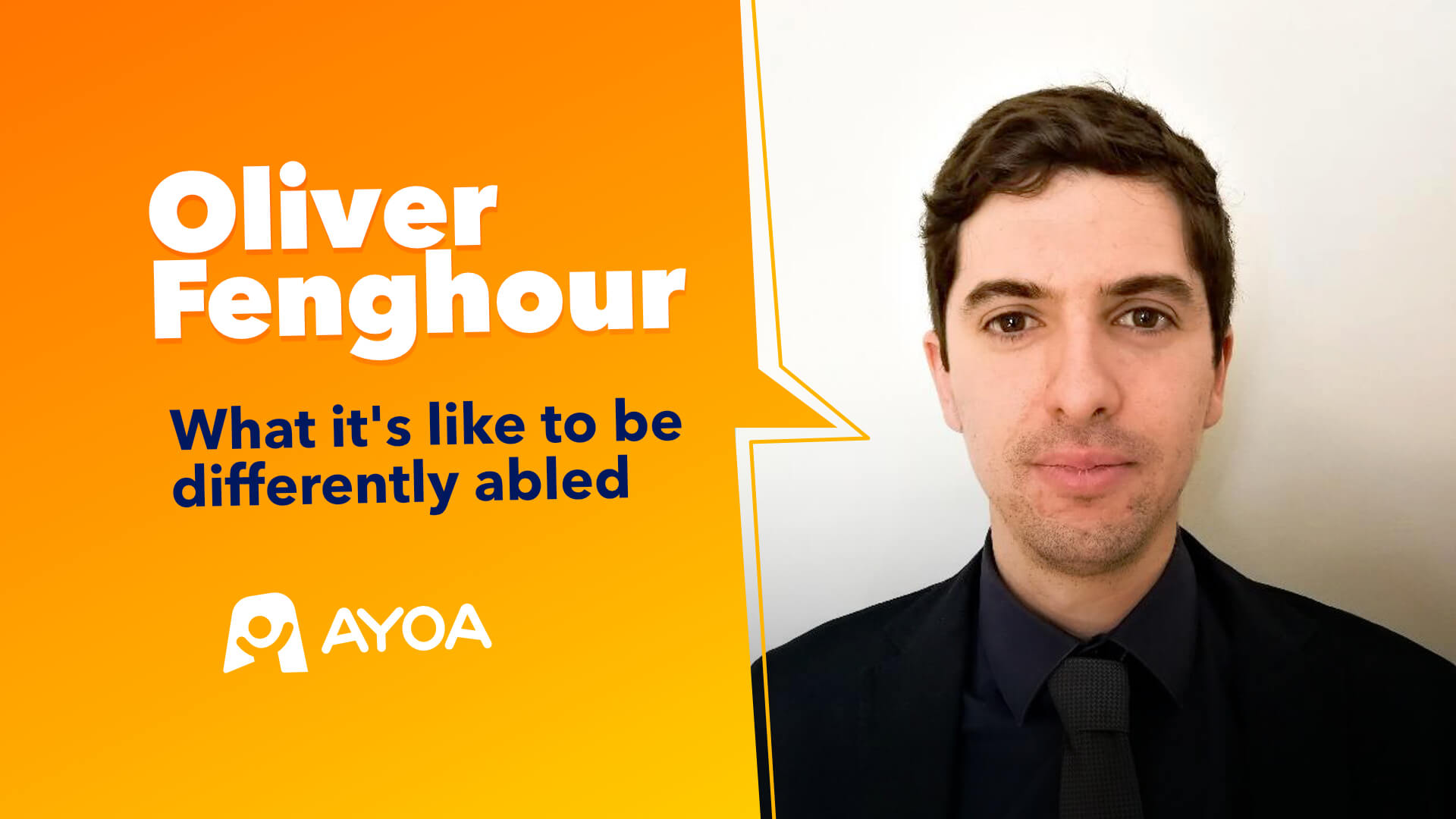December 7, 2020 (Updated February 23rd, 2023)
What it’s like to be Differently Abled: My Story by Oliver Fenghour

Here at Ayoa, we strive to provide neurodivergent individuals with a visually engaging tool to make it quicker and easier for them to make the most of their creativity, process important information and structure their work more effectively.
We spoke to Oliver Fenghour, Founding Director of Advance: The Disability Consultants about his journey with autism, from growing up to making his way through the working world. We also discussed the importance for organizations to understand the benefits that people with autism have to offer.
I was diagnosed with Asperger’s syndrome, a high-functioning form of autism, when I was 10. In hindsight, when I look back at my diagnosis, I never really knew what being on the Autistic Spectrum would mean for me and my loved ones. For my parents, I suspect many conflicting emotions were going through their minds. Would our son live a ‘normal life’? Would he have all the opportunities of his peers? Would he forge a successful career, get married, etc?
Education
Personally, my memories of being diagnosed at a young age made me feel like I was inferior to my peers and contemporaries. Certainly, transitioning from primary school to secondary school was a culture shock which when I reflected upon in later life, I was totally unprepared for. School children at that time could be highly vindictive and nothing prepared me for an environment during my secondary school years which would prove to be such a chastening experience.
I always felt that during my time at secondary school that teacher’s fell into two categories in what they did or did not know about the Autistic Spectrum. The first category would be teachers who simply put me into the prism of eccentric and idiosyncratic behavior that I would eventually grow out of. The second category of teachers had some limited understanding of the Autistic Spectrum, but could not translate a limited abstract understanding into practical support within the classroom. In all honesty, leaving school at 16 with little in the way of meaningful qualifications and no friends was a blessed relief as in many respects, leaving the education system felt like a liberating experience.
Sadly, my story has similar analogous experiences for a fair percentage of children on the Autistic Spectrum. According to educational statistics published by the National Autistic Society, only 34% of teachers have an adequate or reasonable understanding of how to support Autistic children in the classroom. In 2018, the Supreme Court in a landmark case ruled that schools must offer reasonable adjustments to children on the Autistic Spectrum and that expelling them from school was not the answer to the problem.
Employment
When I did leave school at 16, I did go to college for a year until I was 17. However, after a year at college, I felt that it was the right time to take my first steps out into the world of employment. I became an apprentice for a local council near where I lived. Yet, I quickly realized that it was a job that didn’t interest me or that I was suited to.
I persisted in doing the role for around two months, completely unaware that no reasonable adjustments or provisions had been made to support me in the role and eventually, the council decided with little notice to remove me from the role, despite the fact that assurances had been made to me that they would look to frequently update the support they were offering me.
I unfortunately had a similar experience in my next role, where after two months of working for them, they decided to dismiss me on the grounds that I was incapable of doing the job. This was despite the fact that they had never implemented any of the reasonable adjustments recommended by the disability charity that were supporting me at the time, nor had they ever carried out any performance reviews with me during the course of my employment with them.
Too often, organisations assume that a person with autism cannot fulfil a role in the way they are expected too because their autism prevents them from doing so. In reality, as with any job, it comes down to the simple factors of “right person”, “right role”. Evidence from the National Autistic Society estimates that around 60% of organisations either don’t implement reasonable adjustments for autistic employees or fail to implement appropriate reasonable adjustments for those with autism in the workplace. Often, the common reasons cited are a lack of knowledge and understanding of autism which can often end up in an autistic employee being terminated from employment as a consequence.
Reaching a break-through
For me, my story changed when I was 21 and went to work for J Sainsbury PLC. Sainsbury’s from day one identified my needs and the adjustments that I would need to be successful in the workplace. The next 10 years of my employment journey with Sainsbury’s helped build my self-confidence and self-worth with an employer who was patient and compassionate towards their employees. Sainsbury’s helped build me into the person that I am today, and I still have many fond memories of my employment with them.
Around 18 months ago, I decided that the time was ripe to move onto pastures new and see more of what was out there for those such as myself on the Autistic Spectrum. When I joined Sainsbury’s, it seemed apparent then that employers and society had little in the way of knowledge or understanding of those such as myself on the Autistic Spectrum. When I left Sainsbury’s, I thought that with the implementation of the Equality Act in 2010 and the strive to become a diverse and inclusive society, that opportunities for those on the Autistic Spectrum with compassionate, patient employers would be more widespread. Yet, my experiences since leaving Sainsbury’s could not have been more markedly different with employers who seemed more focused on the bottom line, with limited understanding or patience to support and develop Autistic talent within the workplace.
My own personal experiences are sadly very similar to many others on the Autistic Spectrum. Evidence compiled from the National Autistic Society suggests that only 32% of people on the spectrum are in some form of employment. Yet, in the UK an estimated 700,000 people have autism and globally this figure is some 70 million.
As a society, we seem hardwired by this perception that being disabled must mean that you have a physical impediment. This has meant that many people with ‘invisible disabilities’ such as autism have been largely ignored or forgotten about by society. However, recently it was announced that people with ‘hidden disabilities’ can have the right to access blue badges, allowing them to park in disabled spaces in car parks. Yet, this is one small step on what continues to be a long and arduous journey for those on the Autistic Spectrum to gain recognition and acceptance of their differences in a society that is suspicious of difference and wary of change.
Assistive technology and what employers can do
In the workplace, providing enough reasonable adjustments for Autistic employees doesn’t just help those with autism, but it can also benefit those with other disabilities in your organisation.
All organisations need to look at SAP’s autism workplace strategy as a blueprint model for successfully integrating Autistic talent in the workplace. Increasingly, as we advance further into the 21st Century, healthy disruption, innovation, and diversification of ideas will increasingly decide which organisations are the right side of the dichotomy between success and failure. Therefore, having a concise and pliant reasonable adjustments structure is far more likely to succeed in an organisation than one which is fixed and rigid in abstract, as well as application.
Furthermore, assistive technology can play a major role in levelling the playing field for autistic employees in the workplace. The need for assistive technology for autistic employees has grown exponentially in the current socio-economic climate that we are currently experiencing.
How Ayoa can help neurodivergent individuals
Organisations such as Ayoa are playing a pivotal role in ensuring that a level playing field for autistic employees exists. Inclusive technology companies are increasingly utilizing whiteboards, mind mapping tools and Gantt charts to help ensure that employees with autism can organize and structure their working days so they can still be effective employees for the organisations they work for. There has been a tendency during the current crisis to unintentionally overlook autistic employees in the workplace. Yet, if change is managed far enough in advance with new technology systems and sufficient training is given, then the world of employment in the new normal can be a place where autistic employees actively thrive.
Employing people with autism has so many key benefits such as:
Distinctive logical and analytical capabilities.
Sustained concentration and perseverance, even when tasks are repetitive.
Conscientious, loyalty, and sincerity.
An exceptional eye for details, deviations and potential errors.
A strong interest in factual matters and comprehensive technical expertise.
Too often, there is a perception among organisations that autistic people are just idiosyncratic, obstructive, don’t like change and aren’t team players. The very things that make organisations shun wanting to employ people with autism in their workplaces. When only 16% of autistic adults in the UK are in full-time employment and globally (according to research from Microsoft) around 80% of people with autism are unemployed, this sadly tells its own story. Yet, the clue is in the name “reasonable adjustments”, and that actually, if that person with autism can do the job to the same standard as a neurotypical person, why shouldn’t they be given an opportunity to learn and develop within a supportive and encouraging environment?
Only by listening to the voices of autistic people and understanding the world from their perspectives will we actually gain the skills and knowledge necessary to support and develop future generations of autistic talent in the workplace. I personally will not rest until the world is a better & more equitable place for those with autism.
Want to find out more about how Ayoa supports neurodiversity?
Here at Ayoa, we believe that it’s important for every workplace and educational environment to be neurologically inclusive. This means an environment where everyone is able to work to the best of their ability, regardless of neurological differences. Ayoa is a neurologically inclusive tool, with powerful mind mapping and task management capabilities to suit all different styles of working. Find out more on our neurodiversity page here.

